Editorial
Credential inflation and semantic drift

Wednesday 18th December, 2024
A new Speaker was elected unopposed yesterday in Parliament. Dr. Jagath Wickramaratne has succeeded Speaker Asoka Ranwala, who had to resign last week due to his failure to prove his academic credentials. It is popularly said in this country that a person who has been beaten with a firebrand is scared of even fireflies. So, Prime Minister Dr. Harini Amarasuriya and Leader of the House Bimal Ratnayake carefully avoided referring to Wickramaratne as ‘Dr’ when they proposed his name and seconded it, respectively. They may have done so lest they should provoke heckles from the Opposition members, who are making the most of the doctorate scandal in a bid to recover lost ground.
In the run-up to last month’s general election, the JVP-led NPP paraded the doctorates of its candidates to make them out to be superior to their counterparts fielded by other political parties. Its propagandists extolled their academic and professional achievements to the point of queasiness. Today, the government is wary of calling even a qualified medical practitioner a doctor upon his elevation to the Speaker’s post! Such has been the political cost of credential inflation that some NPP MPs resorted to boost their images.
Sri Lankan politics has not only caused the deterioration of economic, political, social, cultural and legal institutions but also led to the devaluation of concepts, ideas, ideals, and titles. Languages evolve and words acquire new meanings mostly through repeated association, which can be contextual, metaphorical, political, social, cultural or otherwise. We saw how the adjective, ‘righteous’, underwent semantic bleaching and drift due to being subject to sloganeering under the J. R. Jayewardene government, which promised to build a ‘righteous society’. ‘Righteous’ took on the exact opposite of its lexical definition and became synonymous with ‘unrighteous’, paradoxical as it may sound, in the political context in that socio-political milieu. The phrase, ‘righteous society’, evokes one’s dreadful memories of election malpractices, political violence, disproportionate counter terror, cronyism, corruption, etc., which the Jayewardene regime was notorious for. The Mahinda Rajapaksa government promised ‘a bright future’, which became a synonym for ‘pie in the sky’ to all intents and purposes. ‘Good governance’ or ‘yahapalanaya’, became devalued and took on a whole new meaning thanks to the UNP-led UNF, which misused it to dupe the public and capture power in 2015. ‘Prosperity and Splendour’, which the Gotabaya Rajapaksa government promised, eventually became coterminous with ‘bankruptcy and untold hardships’. The word, ‘renaissance’ is undergoing semantic bleaching under the incumbent NPP government as there has been no radical departure from the past either politically or economically, and what we are witnessing is stagnation.
The JVP-led NPP came to power by looking down upon almost everything previous governments had done since Independence. It called Sri Lanka’s post-Independence history a curse, and offered to put the country right and achieve progress. Its devaluation drive led to an unprecedented erosion of public trust in vital institutions, especially Parliament, which it vehemently condemned as a den of thieves. Some NPP MPs’ pretence to academic excellence has caused the public to treat academics and other professionals with suspicion and doubt their credentials. Worse, it is thought in some quarters that the courtesy title, Dr, can be as derogatory as ‘pickpocket’, etc., when used before the names of those who are neither doctorate holders nor medical practitioners! Hence, Justice Minister Harshana Nanayakkara’s complaint to the CID that there has been a sinister attempt to discredit him by placing the title, Dr, before his name on the parliamentary website.
The NPP sought a mandate to clean the Augean Stables by the Diyawanna lake and ensure that the national legislature would be full of educated, intelligent, patriotic men and women of integrity. It received an unprecedented mandate for that mission. But today it has had to put its own house in order by ridding itself of mountebanks who have been exposed for their fake academic credentials before it carries out its much-advertised clean-up campaign.
Editorial
A supreme irony

Tuesday 17th December, 2024
President Anura Kumara Dissanayake is scheduled to conclude a successful state visit to India, after having talks with Prime Minister Narendra Modi and other Indian dignitaries on an array of key issues. Some bilateral agreements are also reported to have been inked. Modi and Dissanayake have issued a joint statement. and the latter has invited the former to visit Sri Lanka.
President Dissanayake received a warm welcome from PM Modi and other Indian leaders in New Delhi. The guard of honour he was distinguished with at Rashtrapati Bhavan was of special interest. It is customary for any visiting head of state to be given such honour, but Tuesday’s guard of honour at Rashtrapati Bhavan was replete with historical significance and, above all, irony, which may not have been lost on keen political observers. What we beheld was proof of the resilience of democracy and Indo-Lanka relations.
President Dissanayake is the leader of the JVP, which unleashed mindless terror and plunged Sri Lanka into a protracted bloodbath purportedly to defeat, among other things, what it called Indian expansionism, which is the title of one of its five introductory lectures for new recruits. The JVP banned Indian goods and its death squads even killed traders who sold ‘Bombay onions’, which had to be renamed ‘Lanka big onions’ to save innocent lives. The JVP whipped up anti-Indian sentiments to such an extent that a Sri Lankan naval rating hit visiting Indian Prime Minister Rajiv Gandhi with the butt of his rifle during a guard of honour in 1987. It went all out to torpedo the Indo-Lanka Peace Accord, the 13th Amendment, which paved the way for devolution and the establishment of the Provincial Councils but did not succeed in its endeavour. However, its terror spree destroyed thousands of lives and state assets worth billions of rupees. It also did its darnedest to have the Indian Peace Keeping Force sent back, and scuttle elections.
Terrorism is no means to an end. It is the end and the means both. Rohana Wijeweera, who created the JVP terror in a bid to achieve his political goal, himself became a victim of counterterror, and Rajiv died at the hands of the very terrorists he saved from the Sri Lankan military and backed to the hilt. All those who opted for a Tiger ride for political expediency, suffered the same fate as the ‘Young Lady of Niger’. The tragic ends of President Ranasinghe Premadasa and countless Tamil politicians also serve as examples.
It was also a supreme irony that India, which the JVP once demonised, was the first country to invite JVP leader Dissanayake to a visit as a guest of the Modi government, while he was still in opposition, thereby giving him a much-needed diplomatic leg-up, wherefrom a great deal of legitimacy accrued to his presidential election campaign. Dissanayake himself has said so. Thus, India, which eventually let the LTTE stew in its own juice owing to the latter’s refusal to eschew violence, has arguably facilitated the JVP’s rise to power to a considerable extent.
What has become abundantly clear from the current JVP leader’s accession to the executive presidency, his desire to strengthen the Indo-Lanka ties and his state visit to India is the triumph of democracy over extremism. Democracy has also prevailed over LTTE terror, which destroyed thousands of lives and public assets worth billions of dollars, and the voice of the people in the North and the East is now heard. Today, thanks to the defeat of the LTTE on the military front, the civilians who were under its gun are free to exercise their democratic rights, especially franchise, and children can go to school without fear of being abducted on the way and turned into cannon fodder. There are some unsolved problems, but only a democratic approach will help find solutions thereto.
India is reported to have impressed on the Dissanayake government the need to conduct the Provincial Council polls expeditiously. The latter is sure to do so as soon as possible.
How would Wijeweera react if he knew of Dissanayake’s India visit and commitment to improving Indo-Lanka ties?
Editorial
‘Compass’ under the microscope

Monday 16th December, 2024
The JVP-led NPP, which embarked on a much-advertised, ambitious campaign to clean up Parliament by ‘filling it with honest, educated, intelligent members’, has had to cleanse itself. Speaker Asoka Ranwala had to resign on Friday, unable to prove his claim that he had a doctorate. The NPP leaders, who contested under the Compass symbol, and secured an unprecedented mandate to put the country right, were left with no alternative but to throw Ranwala to the wolves as they did not want the integrity of their moral compass questioned.
‘Doctorgate’, as it were, could not have come at a better time for the Opposition parties, which are still reeling from crushing electoral defeats and licking their wounds. It has provided them with a rallying point and an opportunity to divert public attention from their internal battles over National List appointments. Their leaders are now trying to make themselves out to be paragons of virtue!
Ranwala’s resignation has prompted some other NPP MPs, including ministers, to have the title of Dr. removed from their credentials. The government has been able to forestall the Opposition’s no-confidence motion against Ranwala as the Speaker. But the SJB says it will move a no-faith motion against Ranwala unless he resigns from Parliament on the grounds that he has deceived the voters in the Gampaha District, where he contested last month’s general election.
This, we believe, is a textbook example of twisting the knife. Opposition politicians are taking it a bit too far. Their argument that Ranwala entered Parliament by way of deception, has no leg to stand on. There is reason to believe that he would have been elected even if he had contested without flaunting the title, ‘Dr’, because he has been in the good books of the JVP/NPP leaders, who made it clear to the public that they wanted him elected.
Above all, the people of Gampaha have proved that they are not selective or choosy about the qualifications, educational or otherwise, of the candidates they vote for. In the 2010 general election, they elected a teledrama actress fielded by the UNP, giving her a staggering number of preferential votes simply because she had played the lead role in a subpar soap opera, which became popular. She admitted in a television interview that she knew nothing about Sri Lanka’s Constitution. Today, the UNP as well as its offshoot, the SJB, are out for Ranwala’s blood! Moreover, the people of Gampaha also elected the likes of Mervyn Silva and Prasanna Ranaweera, who boasts of having carried out a chilli powder attack on the UNP MPs in Parliament in 2018. Thankfully, they have not been able to re-enter Parliament.
It looks as if a branch of the Examination Department had to be set up in the parliamentary complex to check the educational qualifications of the MPs. Let the holier-than-thou Opposition politicians, who have taken the moral high ground, and undertaken the task of checking the authenticity of the academic credentials of the NPP politicians, be made to prove their own educational qualifications. We see among them a politician who was once accused of having sat a law examination in a separate room, and obtained external help to score very high marks.
This allegation, which went uninvestigated, should be probed. Better late than never. Some Opposition politicians who are parading their learning and questioning the academic qualifications of others have only aegrotats or unclassified degrees awarded by some foreign universities to candidates who cannot attend examinations due to illnesses.
Power blinds the wielders thereof to reality and fogs their thinking faculties, making it hard for them to act rationally. How the JVP/NPP politicians are behaving exemplifies a pithy local saying about the exclusivity of power and thinking capacity—‘bale thiyanakota mole ne, mole thiyanakota bale ne’ (‘when one has power, one has no brains and when one has brains, one has no power). They are doing exactly what they persistently condemned their predecessors for. A large number of videos highlighting their policy contradictions have gone viral in the digital space.
Worryingly, a bunch of tainted politicians who were beaten badly in last month’s parliamentary polls have been able to make use of the controversy surrounding MP Ranwala’s educational qualifications, to gain some political mileage. They have a remarkable ability to heal their wounds and regain their strength like ‘The Blob’, or ‘the many-headed slime’. The NPP seems to have underestimated their ability to do so. However, it will be a mistake for the Opposition parties to entertain the hope that they will be able to secure a bridgehead in the NPP-dominated national politics and launch a counterattack soon, without making a serious effort to regain public confidence by mending their ways.
Editorial
Perks and privileges

On December 1 television bulletins beamed and the print media published next day news of the presentation of the KT Chitrasiri report on parliamentary and presidential privileges to President Anura Kumara Dissanayake. A smiling president was shown on television screens accepting the gift-wrapped report from the retired supreme court judge who with two others, retired Ministry Secretary D. Dissanayake and retired District Secretary CT Bulumulla had been tasked by the new regime to review the allowances, perks and privileges provided to MPs, ministers and former presidents. The much-awaited report is now being studied, the cabinet spokesman announced at his weekly briefing soon after it was in.
Public opinion has long been running high about how this impoverished country’s legislators have been showering themselves with perks and privileges at heavy cost to the taxpayer. Resentment on this score is huge. It must be said to the credit of the new administration and the president, who pledged during the election campaign to correct this situation, that they lost no time in appointing the Chitrasiri Committee, requiring it to report within a very tight time frame, on this much discussed topic affecting a wide range of politicians including former presidents.
There has been no word yet on the actual content of the report; but the expectation among the public is that, befitting its gift-wrapped presentation, considerable reduction of past extravagances showered on elected officials will be addressed. These politicians sanctimoniously pledged to serve their electors rather than themselves but did quite the reverse. Particularly notable is the fact that President Dissanayake and the new parliament are willing to reduce their own privileges to within bounds of reason.
Given today’s prices, nobody would (or should) grudge an MP his monthly allowance or salary of Rs. 54,286 plus Rs. 100,000 a month to maintain an office. This is topped up with a sitting allowance of Rs. 2,500 a day – usually eight days a month except during the budget debate when there are daily sittings – payable for parliamentary sittings as well as attending meeting of committees on non-sitting days; an entertainment allowance of Rs. 1,000 a month, a driver’s allowance of Rs. 3,500 monthly (if no government driver is provided as for ministers, deputy ministers and state ministers), Rs. 50,000 a month for telephones, a fuel allowance depending on the distance of the member’s electorate from parliament (284 liters of diesel per month for Colombo MPs), a travel allowance of Rs. 2,500 per month each for four personal staff (Rs. 10,000 in all) and stamps to the value of Rs. 350,000 annually. These taken together would not seem excessive.
Public resentment boils not so much over the above package but other lavish benefits served at taxpayer expense. News stories galore have been published about sumptuous subsidized meals served to MPs at the parliament restaurant scandalizing ordinary people struggling to make ends meet. Very often such reports bear no semblance of truth. Shortly after the August 2020 election, an orientation session for MPs threw up an astonishing revelation that an MP’s meal cost Rs. 3,000! This fictitious figure had been calculated by dividing the total parliamentary food cost by 225 – the total number of MPs – when a large number of parliamentary staff and others are also fed off the parliament kitchen. The stated figure was far from accurate and did not reflect the reality. The last speaker (Mahinda Yapa Abeywardene) eventually offered a figure of Rs. 296 per head. But various other figures for fish and vegetarian meals have been bruited around although there was no figure offered for chicken meals that are also served in parliament.
Duty free vehicle permits for MPs have been awarded from time to time – many of them sold on the market for figures running into millions – have infuriated the public. These permits were issued every five years in the past and the new administration is pledged to discontinue this widely condemned practice. President Premadasa used a special police unit headed by a respected senior officer to check on such abuses and that fueled the eventual impeachment resolution against him. Given the huge duties imposed on motor vehicles imported into this country, especially on luxury vehicles, the duty free permits exploited by many parliamentarians are widely resented. Fortunately, the new dispensation has made clear that such practices will not continue.
MPs do need vehicles to carry out their duties and the issue of a non-luxury, fuel efficient vehicle to each of them – and not only government MPs – is not unreasonable. But the present administration has reversed a previous decision to issue vehicles to government MPs and decided to give them a fuel allowance instead. The NPP no doubt, is acutely conscious of its projected image that their MPs are different from those of the past and are more interested in serving their electors than themselves. Equity demands that opposition MPs are similarly treated.
Payments and privileges of former presidents under the Presidents Entitlement Act of 1986 are also under review. These, including city mansions, luxury vehicles, secretarial help etc. in addition to the pension are widely regarded as overly lavish. We have seen two former presidents (Mahinda Rajapaksa and Maithripala Sirirsena) continue in parliament post-retirement presumably drawing current emoluments in addition to their benefits as former presidents. Among those alive today are former Presidents Chandrika Kumaratunga, Mahinda Rajapaksa, Maithripala Sirisena and Ranil Wickremesinghe who served just two years. Mrs. Hema Premadasa, widow of assassinated President R. Premadasa, is also alive and paid a pension, provided a Colombo residence, transport and other privileges. The present government has expressed commitment to trim these including enormous security contingents for politicians past ad present. It has already been said that presidential mansions in various parts of the country including Kandy and Nuwara Eliya are intended to be used for the public benefit.
The intentions of the new administration are excellent. Hopefully there will be delivery as promised.
-

 Opinion2 days ago
Opinion2 days agoDegree is not a title!
-
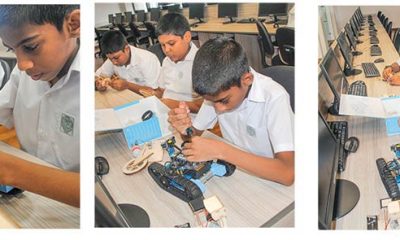
 Features5 days ago
Features5 days agoEmpowering the next generation: St. Benedict’s College brings STEM education to life
-
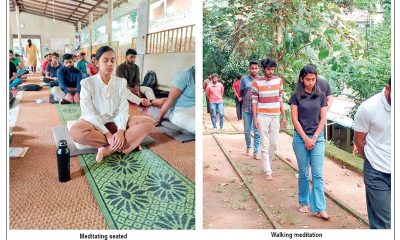
 Features3 days ago
Features3 days agoSpiritual Awakening of a Village
-

 News4 days ago
News4 days agoOver 300,000 Sri Lankans leave for overseas jobs this year
-
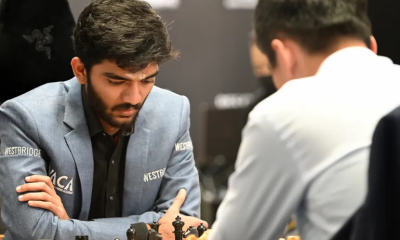
 Latest News4 days ago
Latest News4 days agoIndia’s Gukesh beats China’s Ding to become youngest chess world champion
-
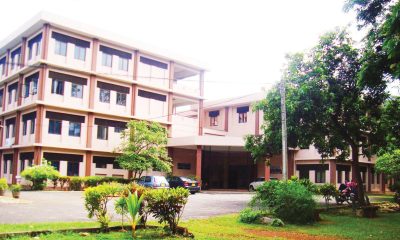
 Features3 days ago
Features3 days agoRevisiting the role of education in shaping shared futures
-

 Editorial6 days ago
Editorial6 days agoAll hat and no cattle?
-
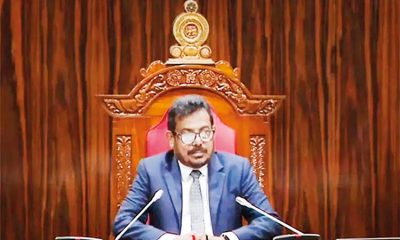
 Features3 days ago
Features3 days agoThe Silence of the Speaker and other matters











